Entrepreneurial Ventures: Scope, Traits, SMEs and Intrapreneurship
VerifiedAdded on 2023/06/05
|20
|4268
|337
Report
AI Summary
This report provides an overview of entrepreneurial ventures, starting with a definition and exploring what it takes to be an entrepreneur, including communication, teamwork, risk-taking, and strategic skills. It examines the scope of entrepreneurial ventures across service, industrial, and rural sectors, and analyzes the characteristics of successful entrepreneurs like Steve Jobs and the owners of Unilever, Sainsbury's and ASDA, focusing on risk tolerance, innovation, long-term focus, team building, and adaptability. The report evaluates the similarities and differences between entrepreneurial ventures, highlighting motives, innovation, risk, and value creation. It further explores the concept of an entrepreneurial mindset and its contributions, such as positive attitude, creativity, risk avoidance, and organizational integrity. The report also discusses how to encourage an entrepreneurial mindset and defines SMEs, assessing their impact on the UK's economy, and explaining intrapreneurship with examples, including its importance in both public and corporate organizations. The report concludes with recommendations for fostering entrepreneurship and ensuring the success of entrepreneurial ventures.

Entrepreneurial
ventures
ventures
Paraphrase This Document
Need a fresh take? Get an instant paraphrase of this document with our AI Paraphraser
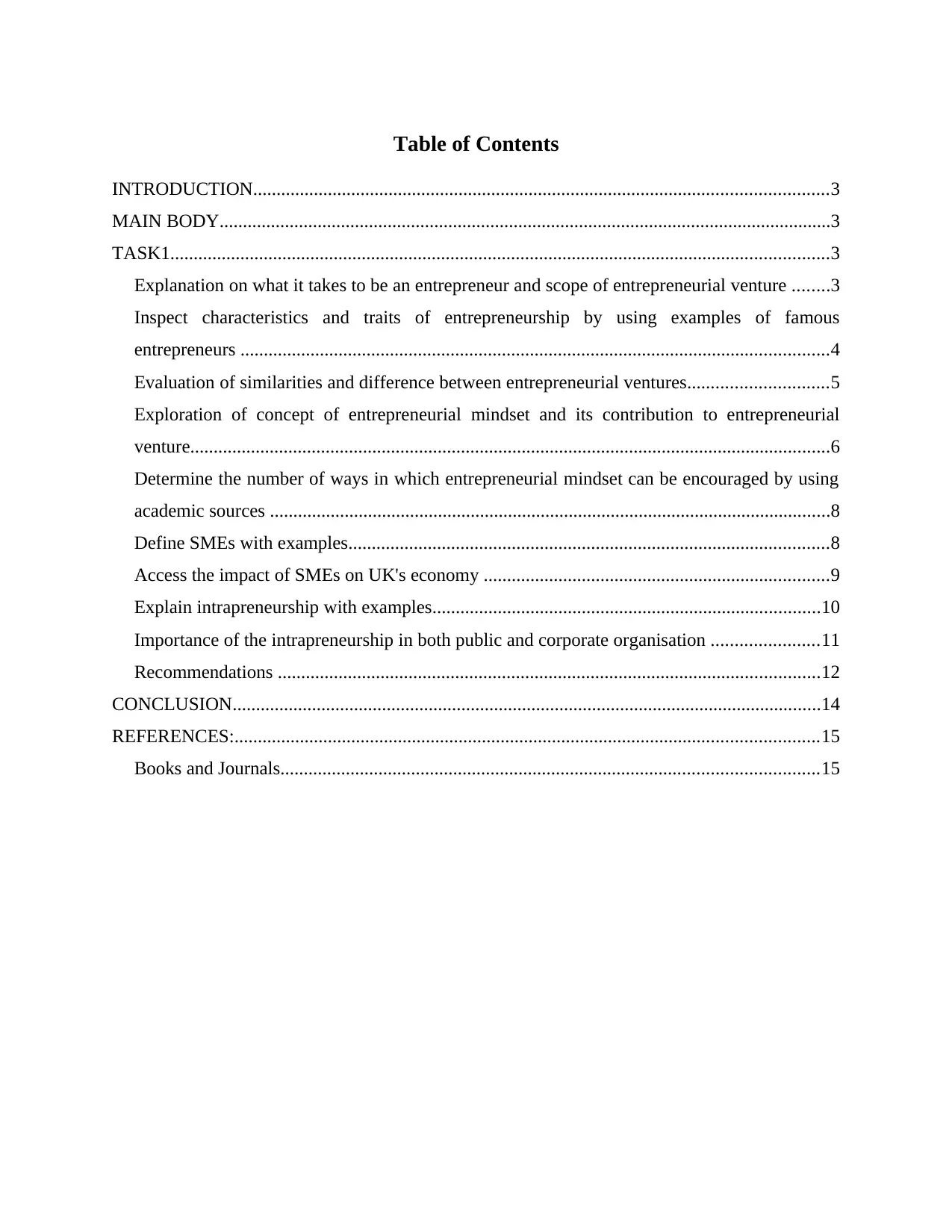
Table of Contents
INTRODUCTION...........................................................................................................................3
MAIN BODY...................................................................................................................................3
TASK1.............................................................................................................................................3
Explanation on what it takes to be an entrepreneur and scope of entrepreneurial venture ........3
Inspect characteristics and traits of entrepreneurship by using examples of famous
entrepreneurs ..............................................................................................................................4
Evaluation of similarities and difference between entrepreneurial ventures..............................5
Exploration of concept of entrepreneurial mindset and its contribution to entrepreneurial
venture.........................................................................................................................................6
Determine the number of ways in which entrepreneurial mindset can be encouraged by using
academic sources ........................................................................................................................8
Define SMEs with examples.......................................................................................................8
Access the impact of SMEs on UK's economy ..........................................................................9
Explain intrapreneurship with examples...................................................................................10
Importance of the intrapreneurship in both public and corporate organisation .......................11
Recommendations ....................................................................................................................12
CONCLUSION..............................................................................................................................14
REFERENCES:.............................................................................................................................15
Books and Journals...................................................................................................................15
INTRODUCTION...........................................................................................................................3
MAIN BODY...................................................................................................................................3
TASK1.............................................................................................................................................3
Explanation on what it takes to be an entrepreneur and scope of entrepreneurial venture ........3
Inspect characteristics and traits of entrepreneurship by using examples of famous
entrepreneurs ..............................................................................................................................4
Evaluation of similarities and difference between entrepreneurial ventures..............................5
Exploration of concept of entrepreneurial mindset and its contribution to entrepreneurial
venture.........................................................................................................................................6
Determine the number of ways in which entrepreneurial mindset can be encouraged by using
academic sources ........................................................................................................................8
Define SMEs with examples.......................................................................................................8
Access the impact of SMEs on UK's economy ..........................................................................9
Explain intrapreneurship with examples...................................................................................10
Importance of the intrapreneurship in both public and corporate organisation .......................11
Recommendations ....................................................................................................................12
CONCLUSION..............................................................................................................................14
REFERENCES:.............................................................................................................................15
Books and Journals...................................................................................................................15
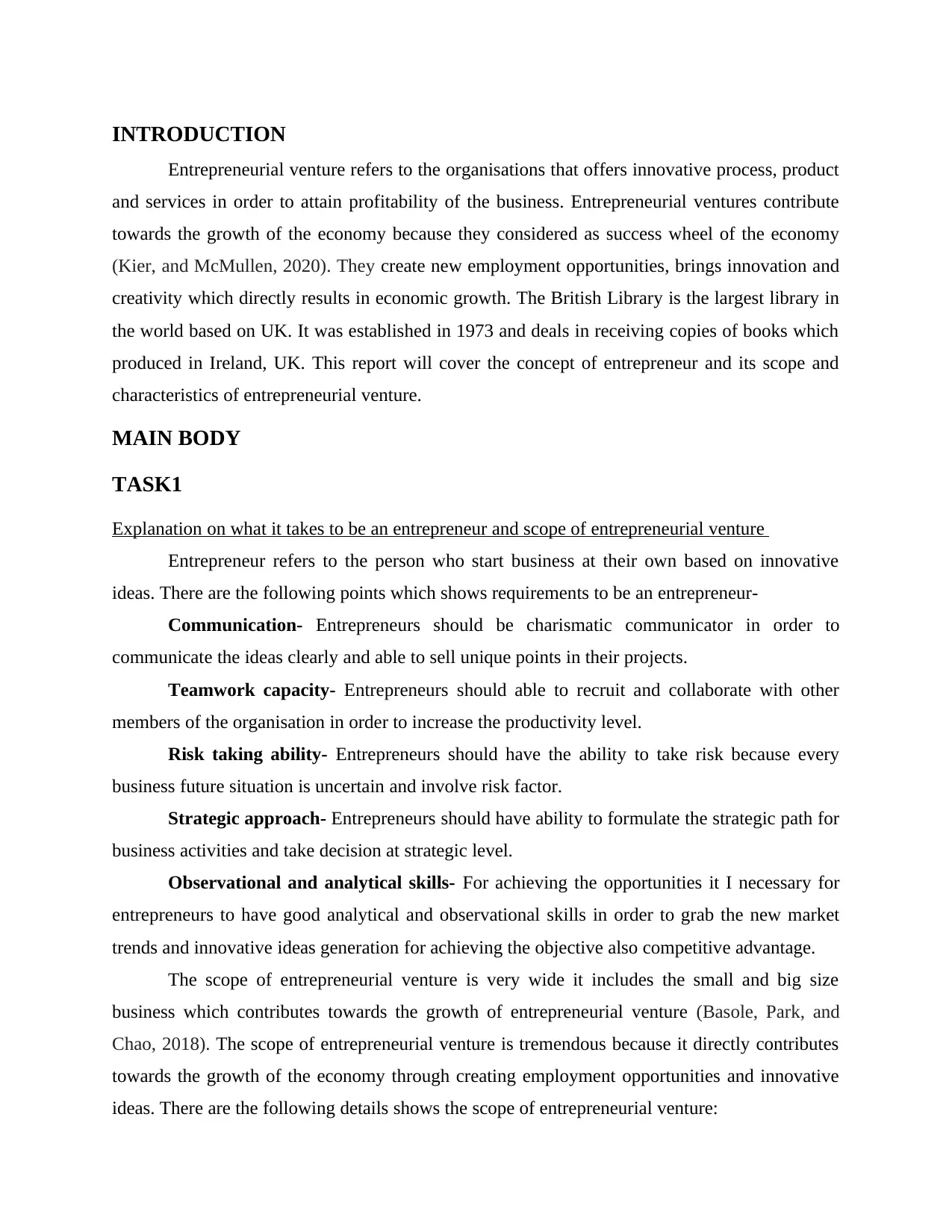
INTRODUCTION
Entrepreneurial venture refers to the organisations that offers innovative process, product
and services in order to attain profitability of the business. Entrepreneurial ventures contribute
towards the growth of the economy because they considered as success wheel of the economy
(Kier, and McMullen, 2020). They create new employment opportunities, brings innovation and
creativity which directly results in economic growth. The British Library is the largest library in
the world based on UK. It was established in 1973 and deals in receiving copies of books which
produced in Ireland, UK. This report will cover the concept of entrepreneur and its scope and
characteristics of entrepreneurial venture.
MAIN BODY
TASK1
Explanation on what it takes to be an entrepreneur and scope of entrepreneurial venture
Entrepreneur refers to the person who start business at their own based on innovative
ideas. There are the following points which shows requirements to be an entrepreneur-
Communication- Entrepreneurs should be charismatic communicator in order to
communicate the ideas clearly and able to sell unique points in their projects.
Teamwork capacity- Entrepreneurs should able to recruit and collaborate with other
members of the organisation in order to increase the productivity level.
Risk taking ability- Entrepreneurs should have the ability to take risk because every
business future situation is uncertain and involve risk factor.
Strategic approach- Entrepreneurs should have ability to formulate the strategic path for
business activities and take decision at strategic level.
Observational and analytical skills- For achieving the opportunities it I necessary for
entrepreneurs to have good analytical and observational skills in order to grab the new market
trends and innovative ideas generation for achieving the objective also competitive advantage.
The scope of entrepreneurial venture is very wide it includes the small and big size
business which contributes towards the growth of entrepreneurial venture (Basole, Park, and
Chao, 2018). The scope of entrepreneurial venture is tremendous because it directly contributes
towards the growth of the economy through creating employment opportunities and innovative
ideas. There are the following details shows the scope of entrepreneurial venture:
Entrepreneurial venture refers to the organisations that offers innovative process, product
and services in order to attain profitability of the business. Entrepreneurial ventures contribute
towards the growth of the economy because they considered as success wheel of the economy
(Kier, and McMullen, 2020). They create new employment opportunities, brings innovation and
creativity which directly results in economic growth. The British Library is the largest library in
the world based on UK. It was established in 1973 and deals in receiving copies of books which
produced in Ireland, UK. This report will cover the concept of entrepreneur and its scope and
characteristics of entrepreneurial venture.
MAIN BODY
TASK1
Explanation on what it takes to be an entrepreneur and scope of entrepreneurial venture
Entrepreneur refers to the person who start business at their own based on innovative
ideas. There are the following points which shows requirements to be an entrepreneur-
Communication- Entrepreneurs should be charismatic communicator in order to
communicate the ideas clearly and able to sell unique points in their projects.
Teamwork capacity- Entrepreneurs should able to recruit and collaborate with other
members of the organisation in order to increase the productivity level.
Risk taking ability- Entrepreneurs should have the ability to take risk because every
business future situation is uncertain and involve risk factor.
Strategic approach- Entrepreneurs should have ability to formulate the strategic path for
business activities and take decision at strategic level.
Observational and analytical skills- For achieving the opportunities it I necessary for
entrepreneurs to have good analytical and observational skills in order to grab the new market
trends and innovative ideas generation for achieving the objective also competitive advantage.
The scope of entrepreneurial venture is very wide it includes the small and big size
business which contributes towards the growth of entrepreneurial venture (Basole, Park, and
Chao, 2018). The scope of entrepreneurial venture is tremendous because it directly contributes
towards the growth of the economy through creating employment opportunities and innovative
ideas. There are the following details shows the scope of entrepreneurial venture:
⊘ This is a preview!⊘
Do you want full access?
Subscribe today to unlock all pages.

Trusted by 1+ million students worldwide
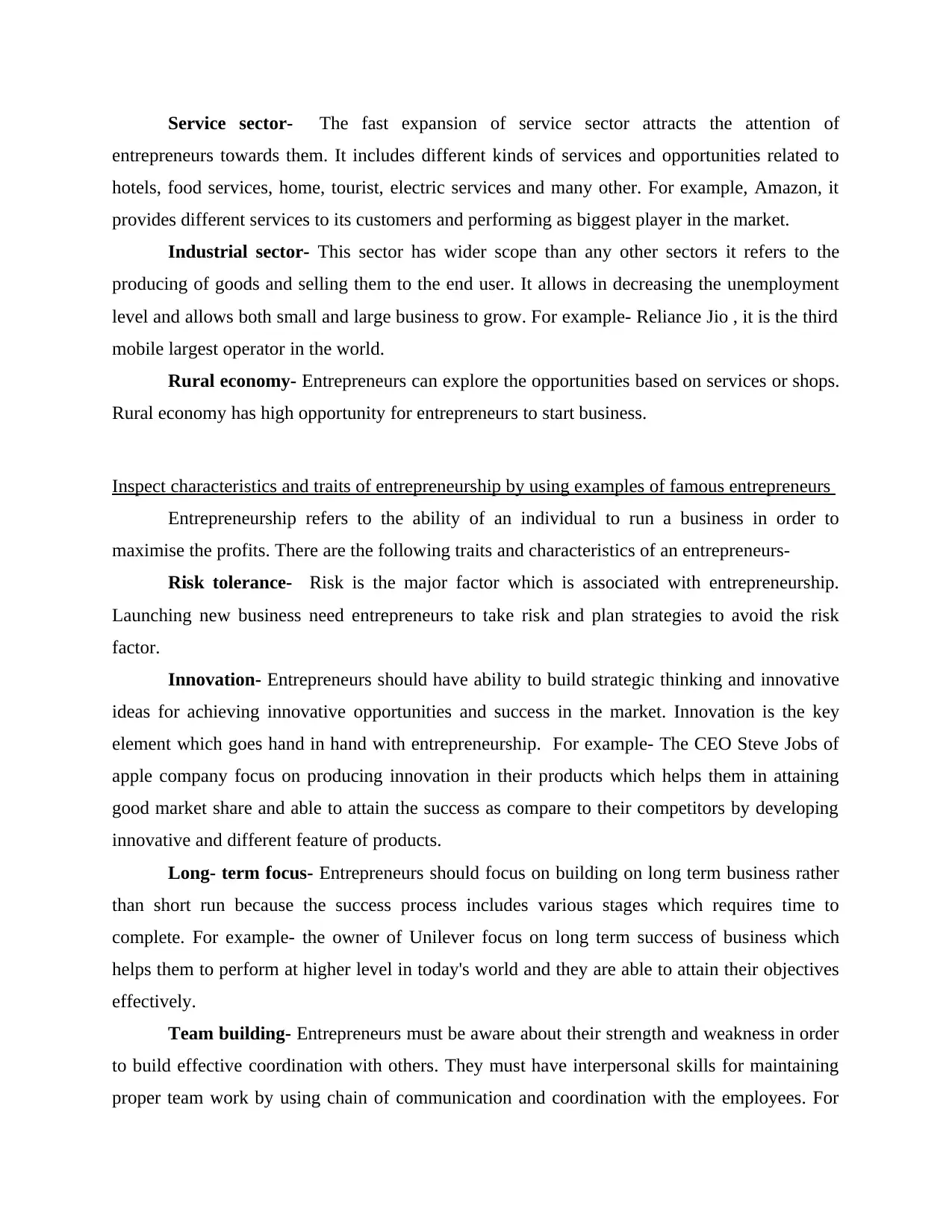
Service sector- The fast expansion of service sector attracts the attention of
entrepreneurs towards them. It includes different kinds of services and opportunities related to
hotels, food services, home, tourist, electric services and many other. For example, Amazon, it
provides different services to its customers and performing as biggest player in the market.
Industrial sector- This sector has wider scope than any other sectors it refers to the
producing of goods and selling them to the end user. It allows in decreasing the unemployment
level and allows both small and large business to grow. For example- Reliance Jio , it is the third
mobile largest operator in the world.
Rural economy- Entrepreneurs can explore the opportunities based on services or shops.
Rural economy has high opportunity for entrepreneurs to start business.
Inspect characteristics and traits of entrepreneurship by using examples of famous entrepreneurs
Entrepreneurship refers to the ability of an individual to run a business in order to
maximise the profits. There are the following traits and characteristics of an entrepreneurs-
Risk tolerance- Risk is the major factor which is associated with entrepreneurship.
Launching new business need entrepreneurs to take risk and plan strategies to avoid the risk
factor.
Innovation- Entrepreneurs should have ability to build strategic thinking and innovative
ideas for achieving innovative opportunities and success in the market. Innovation is the key
element which goes hand in hand with entrepreneurship. For example- The CEO Steve Jobs of
apple company focus on producing innovation in their products which helps them in attaining
good market share and able to attain the success as compare to their competitors by developing
innovative and different feature of products.
Long- term focus- Entrepreneurs should focus on building on long term business rather
than short run because the success process includes various stages which requires time to
complete. For example- the owner of Unilever focus on long term success of business which
helps them to perform at higher level in today's world and they are able to attain their objectives
effectively.
Team building- Entrepreneurs must be aware about their strength and weakness in order
to build effective coordination with others. They must have interpersonal skills for maintaining
proper team work by using chain of communication and coordination with the employees. For
entrepreneurs towards them. It includes different kinds of services and opportunities related to
hotels, food services, home, tourist, electric services and many other. For example, Amazon, it
provides different services to its customers and performing as biggest player in the market.
Industrial sector- This sector has wider scope than any other sectors it refers to the
producing of goods and selling them to the end user. It allows in decreasing the unemployment
level and allows both small and large business to grow. For example- Reliance Jio , it is the third
mobile largest operator in the world.
Rural economy- Entrepreneurs can explore the opportunities based on services or shops.
Rural economy has high opportunity for entrepreneurs to start business.
Inspect characteristics and traits of entrepreneurship by using examples of famous entrepreneurs
Entrepreneurship refers to the ability of an individual to run a business in order to
maximise the profits. There are the following traits and characteristics of an entrepreneurs-
Risk tolerance- Risk is the major factor which is associated with entrepreneurship.
Launching new business need entrepreneurs to take risk and plan strategies to avoid the risk
factor.
Innovation- Entrepreneurs should have ability to build strategic thinking and innovative
ideas for achieving innovative opportunities and success in the market. Innovation is the key
element which goes hand in hand with entrepreneurship. For example- The CEO Steve Jobs of
apple company focus on producing innovation in their products which helps them in attaining
good market share and able to attain the success as compare to their competitors by developing
innovative and different feature of products.
Long- term focus- Entrepreneurs should focus on building on long term business rather
than short run because the success process includes various stages which requires time to
complete. For example- the owner of Unilever focus on long term success of business which
helps them to perform at higher level in today's world and they are able to attain their objectives
effectively.
Team building- Entrepreneurs must be aware about their strength and weakness in order
to build effective coordination with others. They must have interpersonal skills for maintaining
proper team work by using chain of communication and coordination with the employees. For
Paraphrase This Document
Need a fresh take? Get an instant paraphrase of this document with our AI Paraphraser
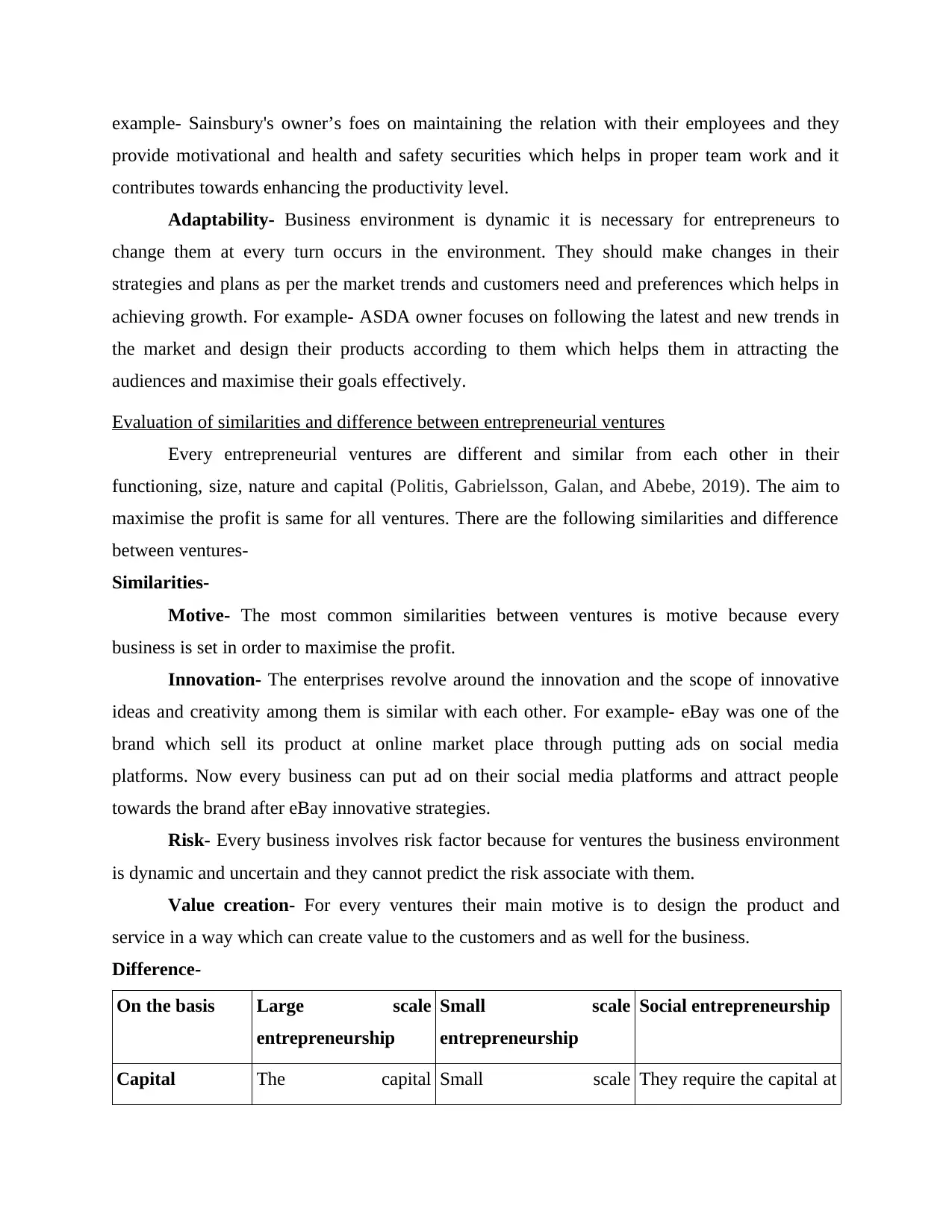
example- Sainsbury's owner’s foes on maintaining the relation with their employees and they
provide motivational and health and safety securities which helps in proper team work and it
contributes towards enhancing the productivity level.
Adaptability- Business environment is dynamic it is necessary for entrepreneurs to
change them at every turn occurs in the environment. They should make changes in their
strategies and plans as per the market trends and customers need and preferences which helps in
achieving growth. For example- ASDA owner focuses on following the latest and new trends in
the market and design their products according to them which helps them in attracting the
audiences and maximise their goals effectively.
Evaluation of similarities and difference between entrepreneurial ventures
Every entrepreneurial ventures are different and similar from each other in their
functioning, size, nature and capital (Politis, Gabrielsson, Galan, and Abebe, 2019). The aim to
maximise the profit is same for all ventures. There are the following similarities and difference
between ventures-
Similarities-
Motive- The most common similarities between ventures is motive because every
business is set in order to maximise the profit.
Innovation- The enterprises revolve around the innovation and the scope of innovative
ideas and creativity among them is similar with each other. For example- eBay was one of the
brand which sell its product at online market place through putting ads on social media
platforms. Now every business can put ad on their social media platforms and attract people
towards the brand after eBay innovative strategies.
Risk- Every business involves risk factor because for ventures the business environment
is dynamic and uncertain and they cannot predict the risk associate with them.
Value creation- For every ventures their main motive is to design the product and
service in a way which can create value to the customers and as well for the business.
Difference-
On the basis Large scale
entrepreneurship
Small scale
entrepreneurship
Social entrepreneurship
Capital The capital Small scale They require the capital at
provide motivational and health and safety securities which helps in proper team work and it
contributes towards enhancing the productivity level.
Adaptability- Business environment is dynamic it is necessary for entrepreneurs to
change them at every turn occurs in the environment. They should make changes in their
strategies and plans as per the market trends and customers need and preferences which helps in
achieving growth. For example- ASDA owner focuses on following the latest and new trends in
the market and design their products according to them which helps them in attracting the
audiences and maximise their goals effectively.
Evaluation of similarities and difference between entrepreneurial ventures
Every entrepreneurial ventures are different and similar from each other in their
functioning, size, nature and capital (Politis, Gabrielsson, Galan, and Abebe, 2019). The aim to
maximise the profit is same for all ventures. There are the following similarities and difference
between ventures-
Similarities-
Motive- The most common similarities between ventures is motive because every
business is set in order to maximise the profit.
Innovation- The enterprises revolve around the innovation and the scope of innovative
ideas and creativity among them is similar with each other. For example- eBay was one of the
brand which sell its product at online market place through putting ads on social media
platforms. Now every business can put ad on their social media platforms and attract people
towards the brand after eBay innovative strategies.
Risk- Every business involves risk factor because for ventures the business environment
is dynamic and uncertain and they cannot predict the risk associate with them.
Value creation- For every ventures their main motive is to design the product and
service in a way which can create value to the customers and as well for the business.
Difference-
On the basis Large scale
entrepreneurship
Small scale
entrepreneurship
Social entrepreneurship
Capital The capital Small scale They require the capital at
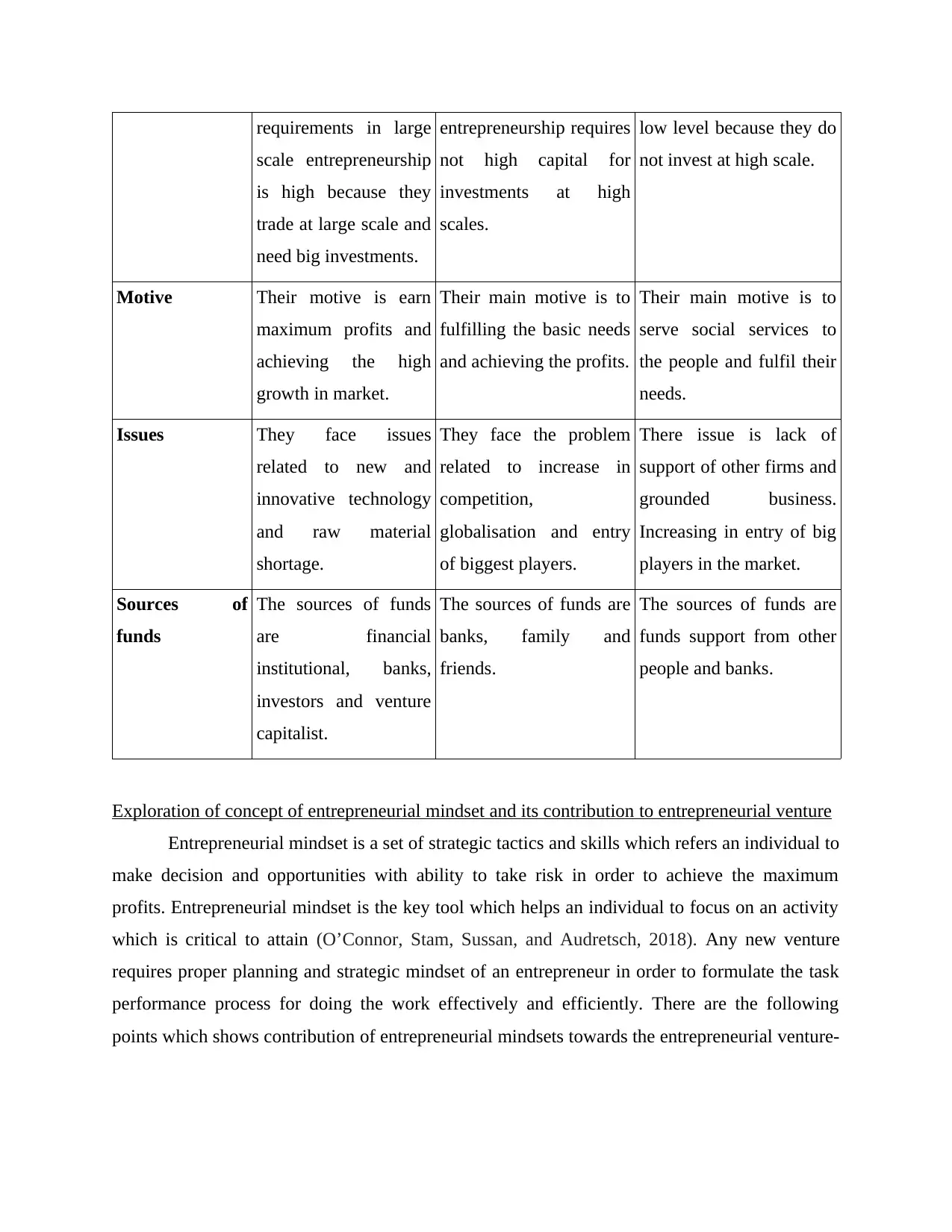
requirements in large
scale entrepreneurship
is high because they
trade at large scale and
need big investments.
entrepreneurship requires
not high capital for
investments at high
scales.
low level because they do
not invest at high scale.
Motive Their motive is earn
maximum profits and
achieving the high
growth in market.
Their main motive is to
fulfilling the basic needs
and achieving the profits.
Their main motive is to
serve social services to
the people and fulfil their
needs.
Issues They face issues
related to new and
innovative technology
and raw material
shortage.
They face the problem
related to increase in
competition,
globalisation and entry
of biggest players.
There issue is lack of
support of other firms and
grounded business.
Increasing in entry of big
players in the market.
Sources of
funds
The sources of funds
are financial
institutional, banks,
investors and venture
capitalist.
The sources of funds are
banks, family and
friends.
The sources of funds are
funds support from other
people and banks.
Exploration of concept of entrepreneurial mindset and its contribution to entrepreneurial venture
Entrepreneurial mindset is a set of strategic tactics and skills which refers an individual to
make decision and opportunities with ability to take risk in order to achieve the maximum
profits. Entrepreneurial mindset is the key tool which helps an individual to focus on an activity
which is critical to attain (O’Connor, Stam, Sussan, and Audretsch, 2018). Any new venture
requires proper planning and strategic mindset of an entrepreneur in order to formulate the task
performance process for doing the work effectively and efficiently. There are the following
points which shows contribution of entrepreneurial mindsets towards the entrepreneurial venture-
scale entrepreneurship
is high because they
trade at large scale and
need big investments.
entrepreneurship requires
not high capital for
investments at high
scales.
low level because they do
not invest at high scale.
Motive Their motive is earn
maximum profits and
achieving the high
growth in market.
Their main motive is to
fulfilling the basic needs
and achieving the profits.
Their main motive is to
serve social services to
the people and fulfil their
needs.
Issues They face issues
related to new and
innovative technology
and raw material
shortage.
They face the problem
related to increase in
competition,
globalisation and entry
of biggest players.
There issue is lack of
support of other firms and
grounded business.
Increasing in entry of big
players in the market.
Sources of
funds
The sources of funds
are financial
institutional, banks,
investors and venture
capitalist.
The sources of funds are
banks, family and
friends.
The sources of funds are
funds support from other
people and banks.
Exploration of concept of entrepreneurial mindset and its contribution to entrepreneurial venture
Entrepreneurial mindset is a set of strategic tactics and skills which refers an individual to
make decision and opportunities with ability to take risk in order to achieve the maximum
profits. Entrepreneurial mindset is the key tool which helps an individual to focus on an activity
which is critical to attain (O’Connor, Stam, Sussan, and Audretsch, 2018). Any new venture
requires proper planning and strategic mindset of an entrepreneur in order to formulate the task
performance process for doing the work effectively and efficiently. There are the following
points which shows contribution of entrepreneurial mindsets towards the entrepreneurial venture-
⊘ This is a preview!⊘
Do you want full access?
Subscribe today to unlock all pages.

Trusted by 1+ million students worldwide
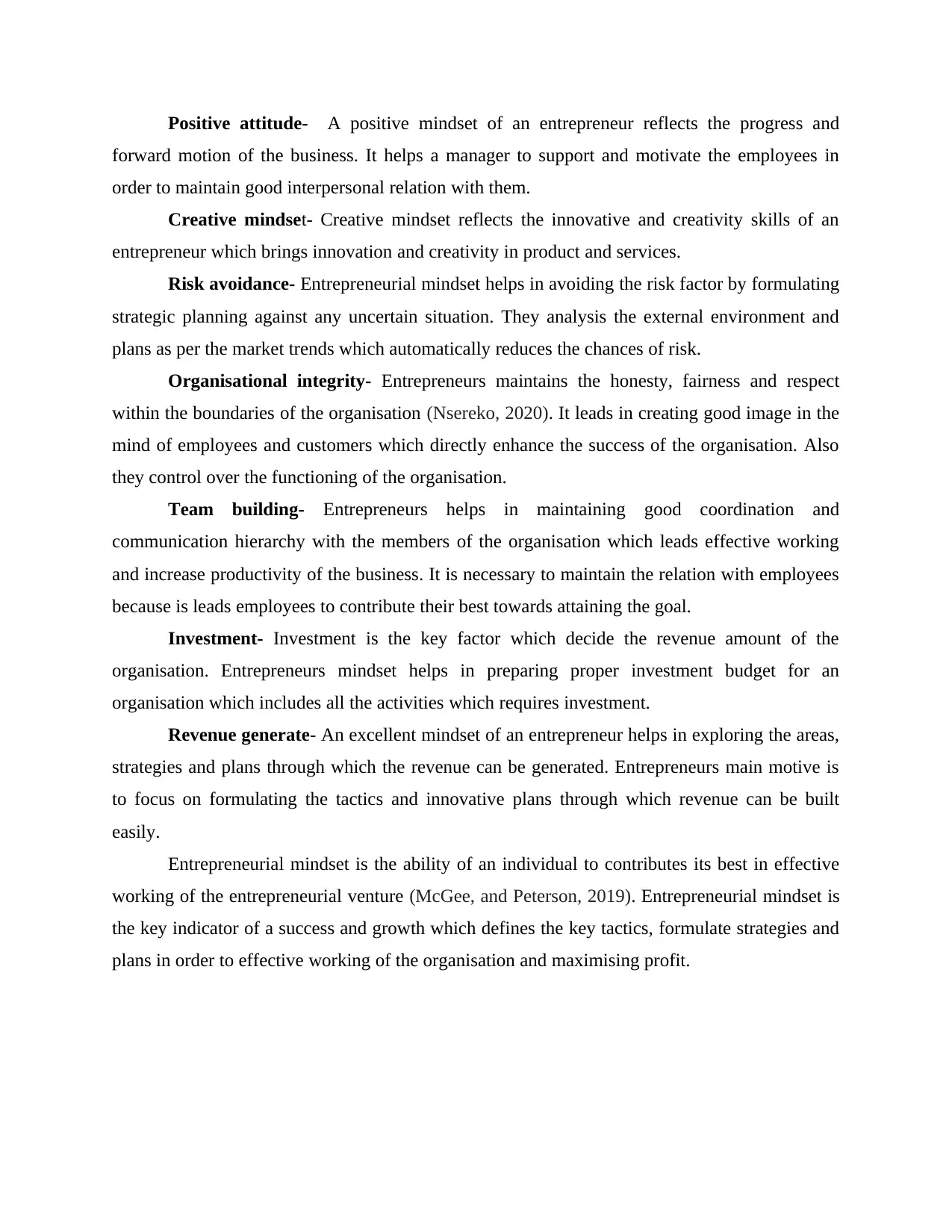
Positive attitude- A positive mindset of an entrepreneur reflects the progress and
forward motion of the business. It helps a manager to support and motivate the employees in
order to maintain good interpersonal relation with them.
Creative mindset- Creative mindset reflects the innovative and creativity skills of an
entrepreneur which brings innovation and creativity in product and services.
Risk avoidance- Entrepreneurial mindset helps in avoiding the risk factor by formulating
strategic planning against any uncertain situation. They analysis the external environment and
plans as per the market trends which automatically reduces the chances of risk.
Organisational integrity- Entrepreneurs maintains the honesty, fairness and respect
within the boundaries of the organisation (Nsereko, 2020). It leads in creating good image in the
mind of employees and customers which directly enhance the success of the organisation. Also
they control over the functioning of the organisation.
Team building- Entrepreneurs helps in maintaining good coordination and
communication hierarchy with the members of the organisation which leads effective working
and increase productivity of the business. It is necessary to maintain the relation with employees
because is leads employees to contribute their best towards attaining the goal.
Investment- Investment is the key factor which decide the revenue amount of the
organisation. Entrepreneurs mindset helps in preparing proper investment budget for an
organisation which includes all the activities which requires investment.
Revenue generate- An excellent mindset of an entrepreneur helps in exploring the areas,
strategies and plans through which the revenue can be generated. Entrepreneurs main motive is
to focus on formulating the tactics and innovative plans through which revenue can be built
easily.
Entrepreneurial mindset is the ability of an individual to contributes its best in effective
working of the entrepreneurial venture (McGee, and Peterson, 2019). Entrepreneurial mindset is
the key indicator of a success and growth which defines the key tactics, formulate strategies and
plans in order to effective working of the organisation and maximising profit.
forward motion of the business. It helps a manager to support and motivate the employees in
order to maintain good interpersonal relation with them.
Creative mindset- Creative mindset reflects the innovative and creativity skills of an
entrepreneur which brings innovation and creativity in product and services.
Risk avoidance- Entrepreneurial mindset helps in avoiding the risk factor by formulating
strategic planning against any uncertain situation. They analysis the external environment and
plans as per the market trends which automatically reduces the chances of risk.
Organisational integrity- Entrepreneurs maintains the honesty, fairness and respect
within the boundaries of the organisation (Nsereko, 2020). It leads in creating good image in the
mind of employees and customers which directly enhance the success of the organisation. Also
they control over the functioning of the organisation.
Team building- Entrepreneurs helps in maintaining good coordination and
communication hierarchy with the members of the organisation which leads effective working
and increase productivity of the business. It is necessary to maintain the relation with employees
because is leads employees to contribute their best towards attaining the goal.
Investment- Investment is the key factor which decide the revenue amount of the
organisation. Entrepreneurs mindset helps in preparing proper investment budget for an
organisation which includes all the activities which requires investment.
Revenue generate- An excellent mindset of an entrepreneur helps in exploring the areas,
strategies and plans through which the revenue can be generated. Entrepreneurs main motive is
to focus on formulating the tactics and innovative plans through which revenue can be built
easily.
Entrepreneurial mindset is the ability of an individual to contributes its best in effective
working of the entrepreneurial venture (McGee, and Peterson, 2019). Entrepreneurial mindset is
the key indicator of a success and growth which defines the key tactics, formulate strategies and
plans in order to effective working of the organisation and maximising profit.
Paraphrase This Document
Need a fresh take? Get an instant paraphrase of this document with our AI Paraphraser
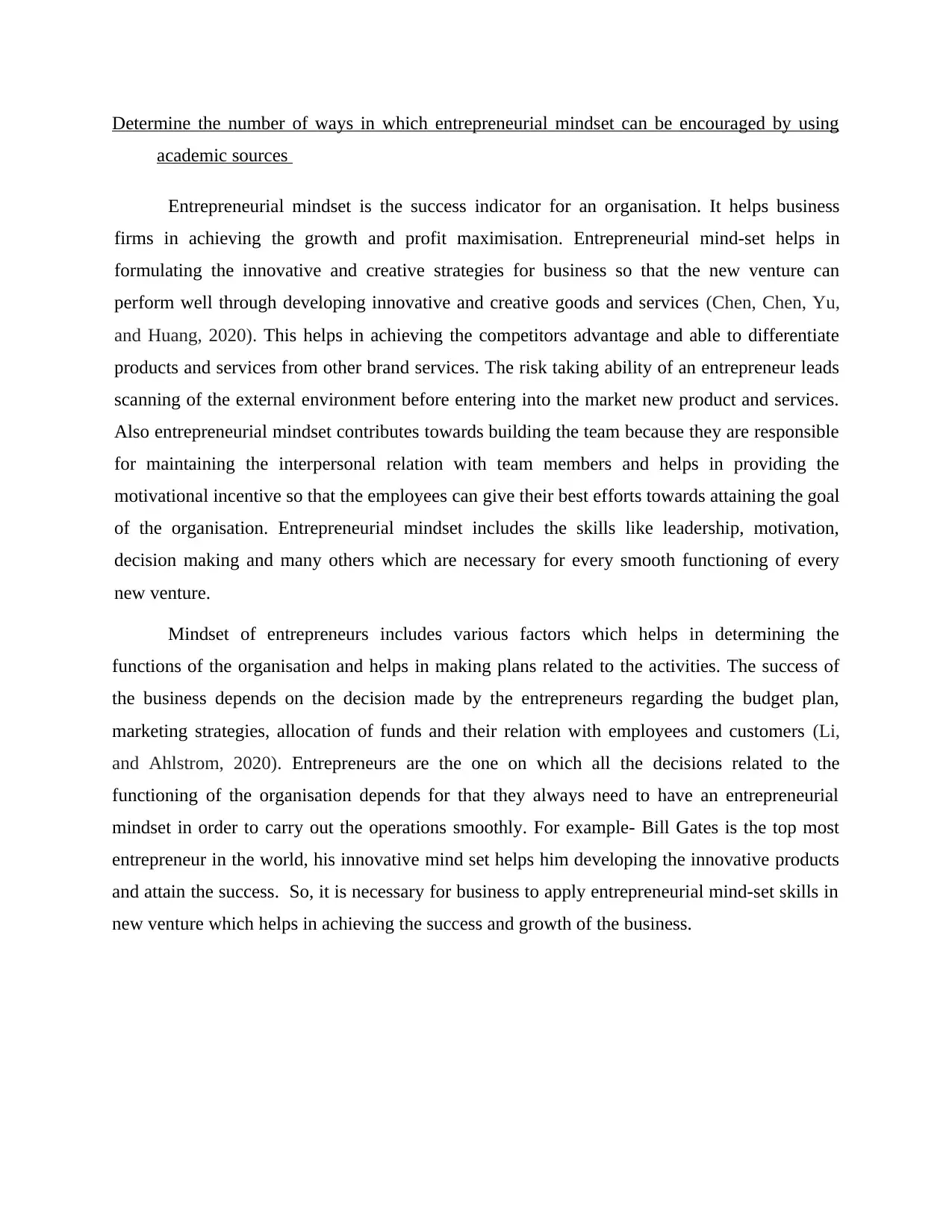
Determine the number of ways in which entrepreneurial mindset can be encouraged by using
academic sources
Entrepreneurial mindset is the success indicator for an organisation. It helps business
firms in achieving the growth and profit maximisation. Entrepreneurial mind-set helps in
formulating the innovative and creative strategies for business so that the new venture can
perform well through developing innovative and creative goods and services (Chen, Chen, Yu,
and Huang, 2020). This helps in achieving the competitors advantage and able to differentiate
products and services from other brand services. The risk taking ability of an entrepreneur leads
scanning of the external environment before entering into the market new product and services.
Also entrepreneurial mindset contributes towards building the team because they are responsible
for maintaining the interpersonal relation with team members and helps in providing the
motivational incentive so that the employees can give their best efforts towards attaining the goal
of the organisation. Entrepreneurial mindset includes the skills like leadership, motivation,
decision making and many others which are necessary for every smooth functioning of every
new venture.
Mindset of entrepreneurs includes various factors which helps in determining the
functions of the organisation and helps in making plans related to the activities. The success of
the business depends on the decision made by the entrepreneurs regarding the budget plan,
marketing strategies, allocation of funds and their relation with employees and customers (Li,
and Ahlstrom, 2020). Entrepreneurs are the one on which all the decisions related to the
functioning of the organisation depends for that they always need to have an entrepreneurial
mindset in order to carry out the operations smoothly. For example- Bill Gates is the top most
entrepreneur in the world, his innovative mind set helps him developing the innovative products
and attain the success. So, it is necessary for business to apply entrepreneurial mind-set skills in
new venture which helps in achieving the success and growth of the business.
academic sources
Entrepreneurial mindset is the success indicator for an organisation. It helps business
firms in achieving the growth and profit maximisation. Entrepreneurial mind-set helps in
formulating the innovative and creative strategies for business so that the new venture can
perform well through developing innovative and creative goods and services (Chen, Chen, Yu,
and Huang, 2020). This helps in achieving the competitors advantage and able to differentiate
products and services from other brand services. The risk taking ability of an entrepreneur leads
scanning of the external environment before entering into the market new product and services.
Also entrepreneurial mindset contributes towards building the team because they are responsible
for maintaining the interpersonal relation with team members and helps in providing the
motivational incentive so that the employees can give their best efforts towards attaining the goal
of the organisation. Entrepreneurial mindset includes the skills like leadership, motivation,
decision making and many others which are necessary for every smooth functioning of every
new venture.
Mindset of entrepreneurs includes various factors which helps in determining the
functions of the organisation and helps in making plans related to the activities. The success of
the business depends on the decision made by the entrepreneurs regarding the budget plan,
marketing strategies, allocation of funds and their relation with employees and customers (Li,
and Ahlstrom, 2020). Entrepreneurs are the one on which all the decisions related to the
functioning of the organisation depends for that they always need to have an entrepreneurial
mindset in order to carry out the operations smoothly. For example- Bill Gates is the top most
entrepreneur in the world, his innovative mind set helps him developing the innovative products
and attain the success. So, it is necessary for business to apply entrepreneurial mind-set skills in
new venture which helps in achieving the success and growth of the business.

TASK 2
⊘ This is a preview!⊘
Do you want full access?
Subscribe today to unlock all pages.

Trusted by 1+ million students worldwide
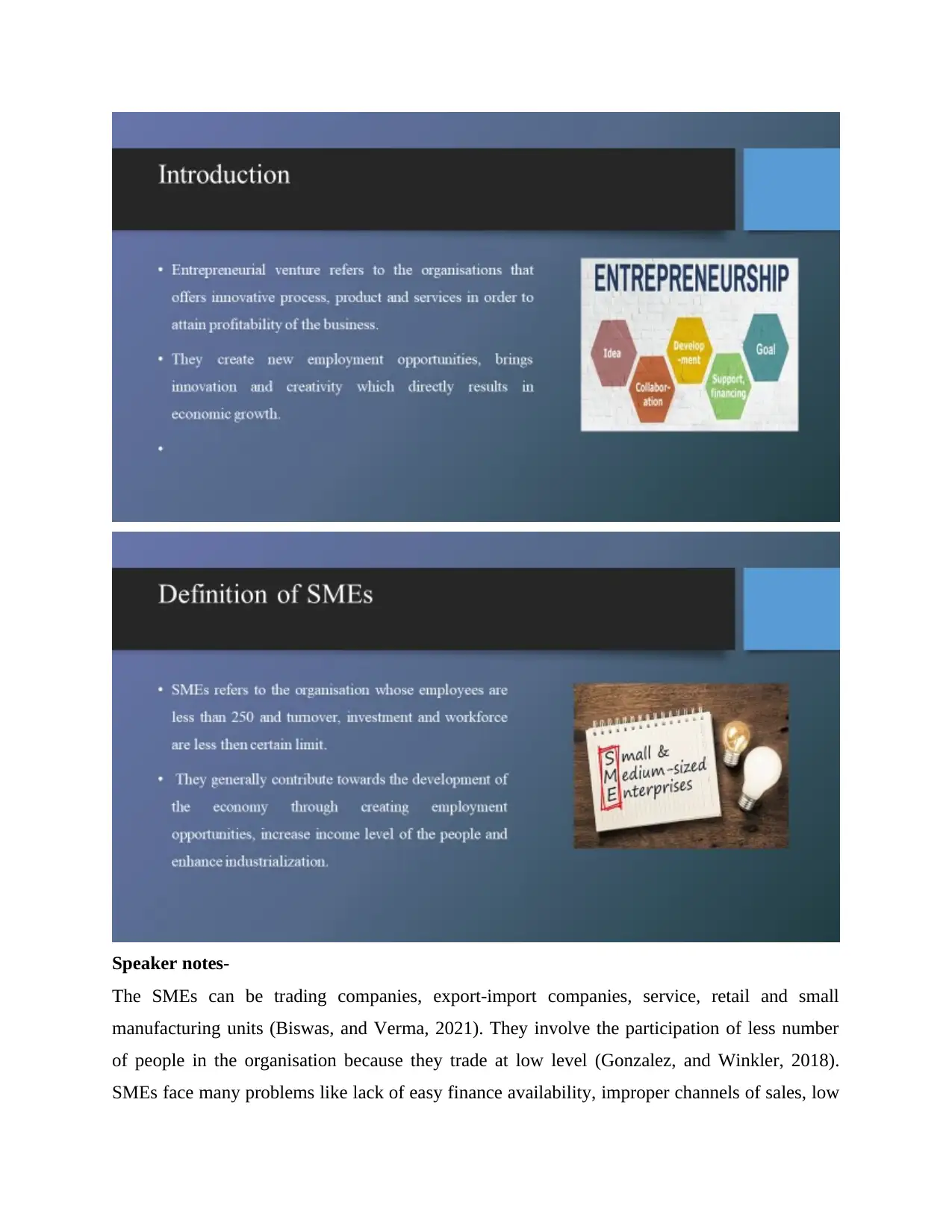
Speaker notes-
The SMEs can be trading companies, export-import companies, service, retail and small
manufacturing units (Biswas, and Verma, 2021). They involve the participation of less number
of people in the organisation because they trade at low level (Gonzalez, and Winkler, 2018).
SMEs face many problems like lack of easy finance availability, improper channels of sales, low
The SMEs can be trading companies, export-import companies, service, retail and small
manufacturing units (Biswas, and Verma, 2021). They involve the participation of less number
of people in the organisation because they trade at low level (Gonzalez, and Winkler, 2018).
SMEs face many problems like lack of easy finance availability, improper channels of sales, low
Paraphrase This Document
Need a fresh take? Get an instant paraphrase of this document with our AI Paraphraser
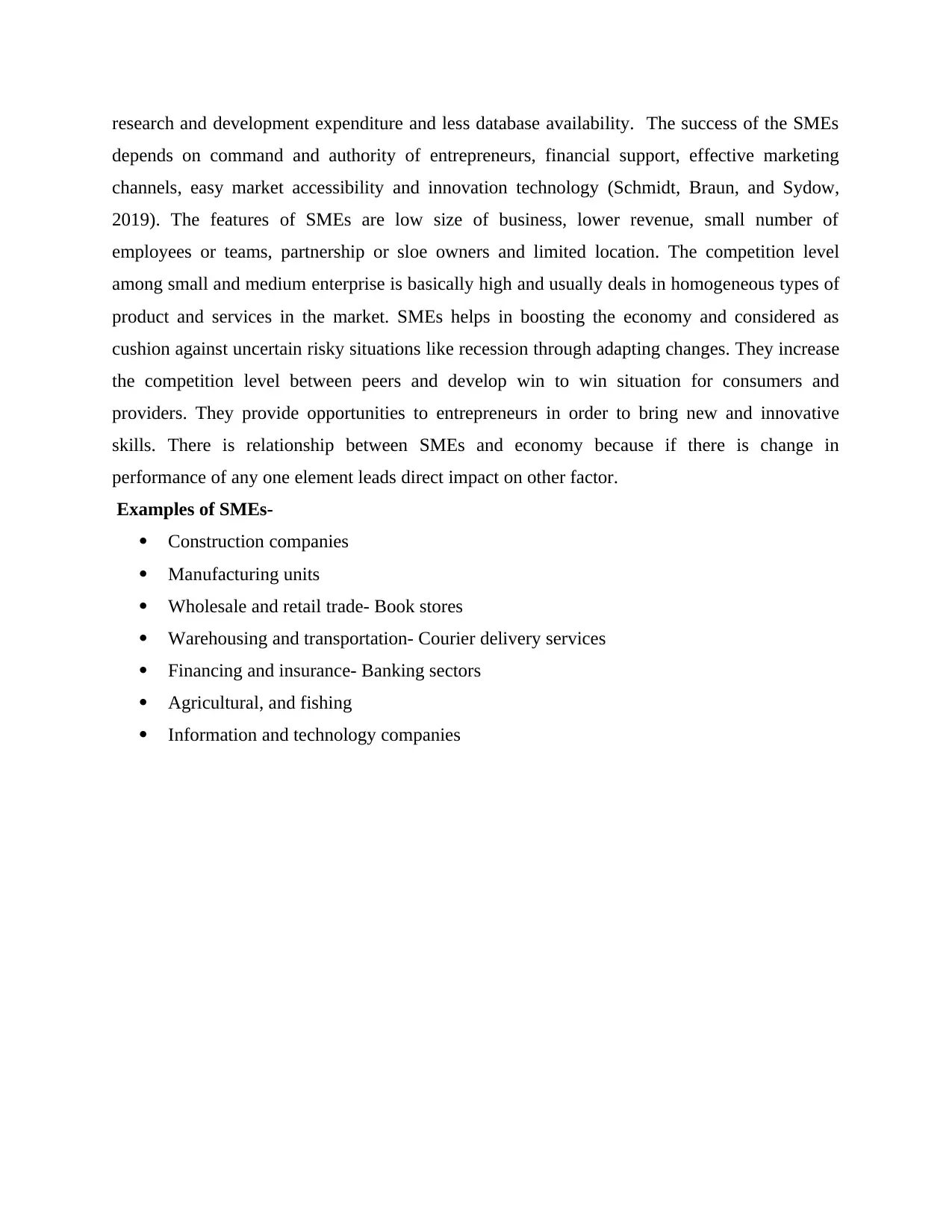
research and development expenditure and less database availability. The success of the SMEs
depends on command and authority of entrepreneurs, financial support, effective marketing
channels, easy market accessibility and innovation technology (Schmidt, Braun, and Sydow,
2019). The features of SMEs are low size of business, lower revenue, small number of
employees or teams, partnership or sloe owners and limited location. The competition level
among small and medium enterprise is basically high and usually deals in homogeneous types of
product and services in the market. SMEs helps in boosting the economy and considered as
cushion against uncertain risky situations like recession through adapting changes. They increase
the competition level between peers and develop win to win situation for consumers and
providers. They provide opportunities to entrepreneurs in order to bring new and innovative
skills. There is relationship between SMEs and economy because if there is change in
performance of any one element leads direct impact on other factor.
Examples of SMEs-
Construction companies
Manufacturing units
Wholesale and retail trade- Book stores
Warehousing and transportation- Courier delivery services
Financing and insurance- Banking sectors
Agricultural, and fishing
Information and technology companies
depends on command and authority of entrepreneurs, financial support, effective marketing
channels, easy market accessibility and innovation technology (Schmidt, Braun, and Sydow,
2019). The features of SMEs are low size of business, lower revenue, small number of
employees or teams, partnership or sloe owners and limited location. The competition level
among small and medium enterprise is basically high and usually deals in homogeneous types of
product and services in the market. SMEs helps in boosting the economy and considered as
cushion against uncertain risky situations like recession through adapting changes. They increase
the competition level between peers and develop win to win situation for consumers and
providers. They provide opportunities to entrepreneurs in order to bring new and innovative
skills. There is relationship between SMEs and economy because if there is change in
performance of any one element leads direct impact on other factor.
Examples of SMEs-
Construction companies
Manufacturing units
Wholesale and retail trade- Book stores
Warehousing and transportation- Courier delivery services
Financing and insurance- Banking sectors
Agricultural, and fishing
Information and technology companies
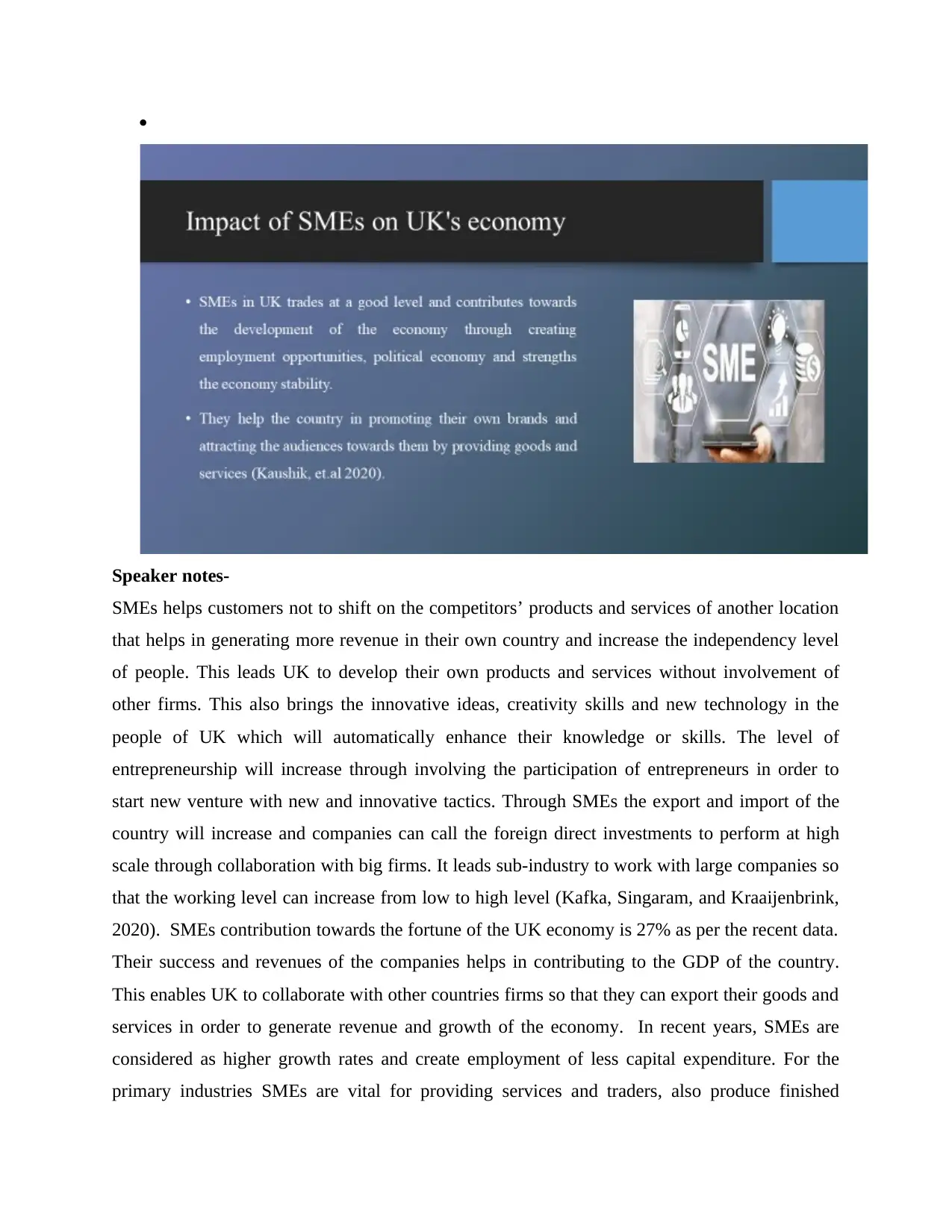
Speaker notes-
SMEs helps customers not to shift on the competitors’ products and services of another location
that helps in generating more revenue in their own country and increase the independency level
of people. This leads UK to develop their own products and services without involvement of
other firms. This also brings the innovative ideas, creativity skills and new technology in the
people of UK which will automatically enhance their knowledge or skills. The level of
entrepreneurship will increase through involving the participation of entrepreneurs in order to
start new venture with new and innovative tactics. Through SMEs the export and import of the
country will increase and companies can call the foreign direct investments to perform at high
scale through collaboration with big firms. It leads sub-industry to work with large companies so
that the working level can increase from low to high level (Kafka, Singaram, and Kraaijenbrink,
2020). SMEs contribution towards the fortune of the UK economy is 27% as per the recent data.
Their success and revenues of the companies helps in contributing to the GDP of the country.
This enables UK to collaborate with other countries firms so that they can export their goods and
services in order to generate revenue and growth of the economy. In recent years, SMEs are
considered as higher growth rates and create employment of less capital expenditure. For the
primary industries SMEs are vital for providing services and traders, also produce finished
Speaker notes-
SMEs helps customers not to shift on the competitors’ products and services of another location
that helps in generating more revenue in their own country and increase the independency level
of people. This leads UK to develop their own products and services without involvement of
other firms. This also brings the innovative ideas, creativity skills and new technology in the
people of UK which will automatically enhance their knowledge or skills. The level of
entrepreneurship will increase through involving the participation of entrepreneurs in order to
start new venture with new and innovative tactics. Through SMEs the export and import of the
country will increase and companies can call the foreign direct investments to perform at high
scale through collaboration with big firms. It leads sub-industry to work with large companies so
that the working level can increase from low to high level (Kafka, Singaram, and Kraaijenbrink,
2020). SMEs contribution towards the fortune of the UK economy is 27% as per the recent data.
Their success and revenues of the companies helps in contributing to the GDP of the country.
This enables UK to collaborate with other countries firms so that they can export their goods and
services in order to generate revenue and growth of the economy. In recent years, SMEs are
considered as higher growth rates and create employment of less capital expenditure. For the
primary industries SMEs are vital for providing services and traders, also produce finished
⊘ This is a preview!⊘
Do you want full access?
Subscribe today to unlock all pages.

Trusted by 1+ million students worldwide
1 out of 20
Related Documents
Your All-in-One AI-Powered Toolkit for Academic Success.
+13062052269
info@desklib.com
Available 24*7 on WhatsApp / Email
![[object Object]](/_next/static/media/star-bottom.7253800d.svg)
Unlock your academic potential
Copyright © 2020–2026 A2Z Services. All Rights Reserved. Developed and managed by ZUCOL.


